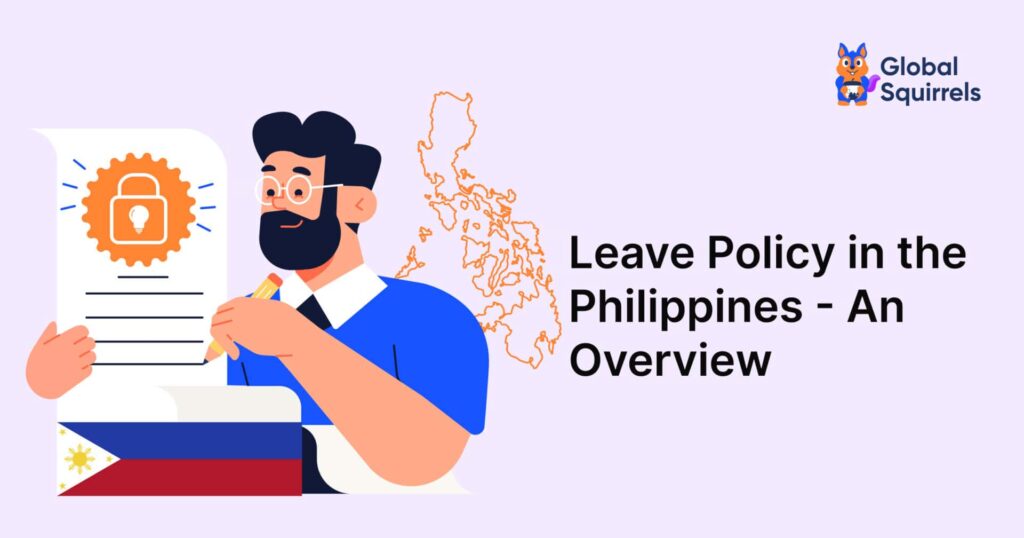Leave Policy in the Philippines – An Overview

Welcome to our detailed exploration of the leave policy in the Philippines. The beautiful Southeast Asian nation is known for its specific provisions for employee leaves. Are you planning to expand your global team? You must understand these leave policies for ensuring compliance and maintaining a harmonious workplace. In the Philippines, employers need to provide employees with service incentive leaves. In addition, we will highlight many more to explore in our blog.
Want to understand employment regulations better? Read our blog on Employment Laws in the Philippines
What Are the Public Holidays in the Philippines for 2025 ?
Here’s the official list of regular and special non-working holidays in the Philippines for 2025, based on the government calendar.
- Regular holidays: According to the leave policy in the Philippines, traditional holiday employees get off days with total wages. If employees work on holidays, they get double wages.
- Special holiday: During special holidays, employees are entitled to non-paid leaves. If employees work, they will get paid 30% extra wages.
Types of Leave in the Philippines (2025 Guide)
| Holiday | Date & day |
| New year’s day | January 1, Monday |
| Maundy | March 28, Thursday |
| Good Friday | March 29, Friday |
| Araw ng Kagitingan | April 9, Tuesday |
| Labor day | May 1, Wednesday |
| Independence day | June 12, Wednesday |
| National heroes day | August 26, Monday ( last Monday of August) |
| Bonifacio day | November 30, Saturday |
| Christmas day | December 25, Wednesday |
| Rizal day | December 30, Monday |
Special holidays for 2025:
| Date | Holiday |
| August 21, Wednesday | Ninoy Aquino day |
| November 1, Friday | All Saint’s day |
| December 8, Sunday | Feast of the immaculate Conception of Mary |
| December 31, Tuesday | Last day of the year |
What are the different types of leaves in the Philippines?
The labor law outlines different kinds of leaves in the Philippines. Here’s a breakdown of the most common ones:
1. Annual Leave
-
Entitlement:
In the Philippines, the Labor Code does not mandate traditional annual leave or vacation leave for private sector employees. Instead, it provides for a Service Incentive Leave (SIL). Employees who have rendered at least one year of service are entitled to five days of paid SIL per year.
However, it is common practice for private companies to go beyond the minimum requirement by offering annual/vacation leave as part of their benefits package. This is typically detailed in company policies or collective bargaining agreements. -
Duration:
The length of annual leave often depends on company policy, the employee’s role, and tenure. Common ranges include:-
5 days (minimum, per SIL requirement after 1 year)
-
10 to 15 days of paid annual leave is common in many private companies
-
Some companies offer additional leave days for every year of service or based on employee level (e.g., managerial or senior positions)
-
-
Other Notes:
-
Annual leave is usually non-cumulative, meaning unused days may not carry over unless the company policy allows.
-
Some companies allow employees to convert unused leave into cash, subject to internal policies and tax rules.
-
Government employees follow a different leave structure and are typically granted 15 days of vacation leave and 15 days of sick leave annually.
-
2. Sick Leave
-
Entitlement:
The Labor Code of the Philippines does not specifically mandate sick leave for private sector employees. However, many companies voluntarily provide paid sick leave as part of their employment benefits. This is typically outlined in the company’s internal policies or collective bargaining agreements.
Employees can also utilize their Service Incentive Leave (SIL)—which grants 5 paid days off annually after one year of service—for sickness if no specific sick leave is provided. -
Duration:
The amount of paid sick leave offered varies by employer, but common practices include:-
5 to 15 days of paid sick leave per year
-
Additional unpaid sick leave may be granted with proper documentation
-
Some companies allow unused sick leave to be carried over or converted to cash, depending on policy
-
-
SSS Sickness Benefit (Government Provision):
-
If an employee has used all available paid leave, they may still be eligible for benefits under the Social Security System (SSS).
-
Employees who have made at least 3 monthly SSS contributions within the last 12 months prior to sickness can qualify.
-
The SSS sickness benefit pays 90% of the employee’s daily salary for up to 120 days per year.
-
The employer initially advances the payment to the employee, and then SSS reimburses the employer.
-
-
Requirements for SSS Sickness Benefit:
-
Proper notification to the employer and SSS
-
Medical certificate or hospital records confirming the illness or confinement
-
Form submissions such as SSS Sickness Notification and Reimbursement Forms
-
-
Important Notes:
-
The benefit does not apply to minor illnesses (e.g., colds, mild flu) unless they result in hospitalization or quarantine.
-
This provision is particularly relevant during prolonged illnesses, hospitalization, or public health crises (e.g., pandemics).
-
3. Maternity Leave
-
Entitlement:
Under the Expanded Maternity Leave Law (Republic Act No. 11210), all female employees in both public and private sectors are entitled to maternity leave benefits, regardless of civil status or the legitimacy of the child. The law ensures adequate recovery time for the mother and bonding time with the newborn. -
Duration:
-
105 days of fully paid maternity leave, regardless of whether the childbirth is via normal delivery or cesarean section.
-
An additional 15 days is granted for solo mothers, as defined by RA 8972 (Solo Parents’ Welfare Act), totaling 120 days.
-
In cases of miscarriage or emergency termination of pregnancy, the female employee is entitled to 60 days of paid maternity leave.
-
The benefit is applicable regardless of the number of pregnancies or frequency of childbirth.
-
-
Allocable Leave:
-
The mother may voluntarily transfer 7 days of her maternity leave to the father of the child, regardless of whether they are married, as long as he is employed (this is called Paternity Leave Allocation).
-
If the father is unavailable or deceased, the 7-day allocation may be transferred to an alternate caregiver, such as a relative within the fourth civil degree or even the current partner.
-
-
SSS Maternity Benefit:
-
Paid by the Social Security System (SSS), not the employer, provided the employee has paid at least 3 monthly contributions in the 12-month period immediately before the semester of childbirth or miscarriage.
-
4. Paternity Leave
-
Entitlement:
Governed by the Paternity Leave Act of 1996 (RA 8187), this leave is for married male employees in the private and public sectors whose legal wife has delivered or suffered a miscarriage. -
Duration:
-
7 days of paid leave for each pregnancy of the legitimate spouse, applicable to the first four deliveries only (including miscarriage).
-
-
Conditions:
-
The male employee must be legally married to the pregnant spouse.
-
He must be cohabiting with his wife at the time of delivery or miscarriage.
-
Leave must be availed of within a reasonable period, usually within the first few days or weeks following the delivery.
-
-
Note:
This leave is separate from any additional leave that may be granted through company policy or the 7-day allocation from the mother’s maternity leave (under RA 11210).
5. Parental leave for solo parents
Entitlement: The Solo Parents’ Welfare Act of 2000 (Republic Act No. 8972) offers additional leave for solo parents.
Duration: Qualified solo parents receive an additional seven days of leave according to leave policy in the Philippines.
6. Special leave for women
Entitlement: The Magna Carta of Women (Republic Act No. 9710) provides special leave for female employees.
Duration: Women who have undergone critical surgery receive two months of leave with full pay.
7. Service incentive leave
Entitlement: According to the Philippines Labor Code, employees get Service Incentive Leave.
Duration: Employees who have rendered at least one year of service receive five days of full-paid incentive leave as per the leave policy in the Philippines.
8. Bereavement Leave in Philippines
-
Entitlement: Bereavement leave is not required under the Philippine Labor Code. Nevertheless, numerous employers provide it to support employees during times of loss. The availability and specifics of this leave depend on individual company policies or collective bargaining agreements.
-
Duration: The length of bereavement leave varies by employer. Common practices include:
-
3 to 5 days of paid leave for immediate family members (e.g., spouse, parent, child, sibling).
-
1 to 2 days for extended family members (e.g., grandparents, in-laws).
-
Some companies may offer up to 7 days of paid leave, depending on their policies.
-
-
Legislative Developments: While bereavement leave isn’t currently mandated, there have been legislative efforts to formalize it:
-
House Bill No. 4340 proposes a 7-day paid bereavement leave for employees in both public and private sectors, covering the death of immediate family members.
-
In the Bangsamoro Autonomous Region in Muslim Mindanao (BARMM), Parliament Bill No. 281 seeks to grant 5 days of paid bereavement leave for employees upon the death of an immediate family member.
-
-
Recommendations for Employees:
-
Review Company Policies: Check your employment contract or employee handbook to understand your company’s bereavement leave provisions.
-
Consult HR: If unclear, discuss with your Human Resources department about available leave options.
-
Documentation: Be prepared to provide necessary documents, such as a death certificate, when applying for bereavement leave.
-
9. Emergency or calamity leave
Entitlement: Some companies provide leave during natural calamities or emergencies, although this depends on the company’s decision.
Employers in the Philippines must adhere to these leave policies stipulated by the labor law and ensure that their company policies align with legal requirements. The implementation of these leave policies should be communicated to all employees.
Note: Leave provisions may vary depending on company policy, employment type, or collective bargaining agreement.
Also Read:Work Culture in Philippines – Learn the Facts
Implementation and compliance with Global Squirrels
If you plan to expand your global team with the Filipino workforce, you must be aware of the leave policy in the Philippines. And, if you want to go the hassle-free way, sign up with Global Squirrels.
It’s one of the leading platforms that assist in remote hiring and payroll management, including compensation and benefits management, managing leaves, and compliance based on international laws.
Want a cost-effective way to hire and manage compliance? Start hiring from just $1.49/hour per employee with Global Squirrels — includes leave tracking, payroll, and tax support. Request a demo
Conclusion
The leave policy in the Philippines includes paid and unpaid leave types like SIL, maternity, paternity, solo parent leave, and more.Understanding the leave policy in the Philippines is essential for both employers and employees to ensure compliance with labor laws and promote a balanced work-life environment. While some leaves are mandated by law, others depend on company policy.
As the Philippines continues to evolve its labor laws, staying informed about these changes is crucial for everyone in the workforce.
